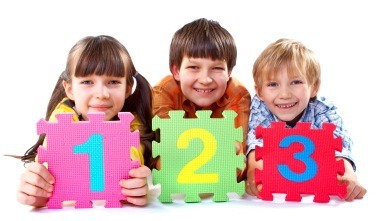Numbers are really important as your child enters kindergarten. Think how you would feel if you could only count to three and the little girl down the way can count to 20.
It is tough when you are a child in kindergarten who is behind most of the other children.
So what can you do to make sure this doesn’t happen with your child? Begin by counting.
Count everything you can think of with her. Count the candies or the pieces of cereal you give her. Count the blocks as she puts them together to make a playhouse for her doll. Count the forks as she helps set the table.
Take your time when you say the numbers so that maybe she will beat you to it and say the number first. It will take very little time for her to begin copying what you are doing and she will start to count, too.
When she first begins counting just like you, she may make mistakes. She may say, “1, 2, 3, 7, 5.” That is OK. She is getting into numbers and that is what is important.
When you are out for a drive, have her count the red cars that go past. Get excited when she sees what she is looking for and tell her grandma that she counted 12 red cars on the road this morning. When you give her a treat of some M&M’s, have her count five of each color before she eats them. When she wants to color, have her pick out six colors she wants to use.
As you go upstairs, count all the steps even if it is far beyond her ability to do that many numbers herself. Before she goes to bed, read a book or two but also think about including books about numbers such as “10 Monkeys Jumping on the Bed” or “Chicka Chicka 1-2-3.”
Go to the library and ask the librarian for help finding books with numbers. Even have your child guess how many blocks it would take to put one block after another until she gets to the next toy. This estimating is even getting pretty sophisticated but she won’t know that.
Use math words. The more children hear math vocabulary used with everyday activities, the more they will begin to use the words correctly.
Simple words such as near, far, besides, between, inside, outside, above, below, in front, behind, over, under, top, bottom, left, right, closer and farther all teach about positions.
Words such as sorting, shortest to longest, biggest to smallest, how many, fewer than, more than, greater than, most, least, the same as, equal, different from, guess and estimate, first and last are all about measurements.
Even words such as square, triangle, circle, point, round, flat, line and corner are all geometry words talking about shapes. Wouldn’t you like to teach your child geometry?
Have a number day. Ask her to find the number four wherever she can. She may find it in the newspaper. It may be on a calendar. It may be part of her address or her phone number. You just want her to find it any where.
Testing done on young children who enter kindergarten show that almost half of the children are not able to recite numbers from 1 to 20.
But the half who do know their numbers really like being ahead. Help your child be a part of the half that knows more about numbers.
You as a parent can make a difference at least for your child.
Cynthia Martin is the founder of the First Teacher program and director of Parenting Matters Foundation, which publishes newsletters for parents, caregivers and grandparents. Reach Martin at pmf@olypen.com or at 681-2250.



